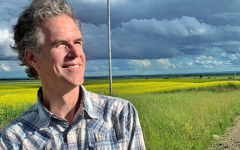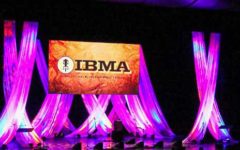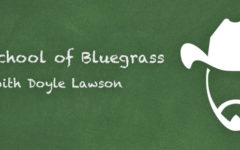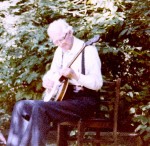 As Thanksgiving approaches, among the many (make that countless) things I am thankful for, I am thankful for my heritage.
As Thanksgiving approaches, among the many (make that countless) things I am thankful for, I am thankful for my heritage.
When I was much younger, particularly as a teenager, I sometimes wished for a more generic last name like Smith or Jones (no offense to all the Smiths and Joneses), which is kind of funny because my mother’s maiden name was Smith. Constant mispronunciation, followed by laughs and teasing, was a part of the start of every school year, as well as everyday life. Despite all the similar last names — Capehart, Gephart, Gearhardt, Gabert, Gayheart, Gabhart, etc. — I have reached the age of 50, having traveled a good deal as a musician and attorney, without ever meeting anyone with the same last name who is not a descendent of my paternal grandfather.
Like many in their youth, I loved my grandparents but probably took them for granted to some degree. I didn’t fully appreciate them until after they were gone, and I had grown and had children of my own. My paternal grandfather, Rev. O. S. Gabehart, and I had a special relationship in some respects because he was a musician, and we shared a love for music. Unfortunately, by the time I was old enough to know him and develop an interest in learning to play string instruments, he had already lost the majority of his hearing and consequently the ability to sing and play.
My father told me stories about my grandfather — how he could play every stringed instrument, piano, harmonica, horns; how he would travel around playing and drawing crowds on the street corners until being chased off by the police for creating a disturbance; how the banjo was his favorite instrument and how he could duplicate the Uncle Dave Macon routines of spinning the banjo between his legs while playing; but how he also played a three finger style when Earl Scruggs was just a gleam in his father’s eyes. I also heard that my grandfather played in the Chicago World’s Fair with the Gibson Musical Instrument Company exhibit and made some records, but I never saw or heard any of them.
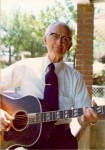 Despite the stories of his abilities and his youthful experiences, I also knew the reality of his life — he married, dedicated his life to Christian ministry, and raised eleven children through the Great Depression, none of which circumstances left room for serious pursuit of music as a profession. Not only did he sacrifice the financial security of full-time employment for full-time ministry, he dedicated his life to building churches. Rather than building a church and staying to enjoy a stable income, he moved from community to community in Kentucky, West Virginia, and Virginia, starting a church and building it to the point where it could support a minister, only to move on and start another.
Despite the stories of his abilities and his youthful experiences, I also knew the reality of his life — he married, dedicated his life to Christian ministry, and raised eleven children through the Great Depression, none of which circumstances left room for serious pursuit of music as a profession. Not only did he sacrifice the financial security of full-time employment for full-time ministry, he dedicated his life to building churches. Rather than building a church and staying to enjoy a stable income, he moved from community to community in Kentucky, West Virginia, and Virginia, starting a church and building it to the point where it could support a minister, only to move on and start another.
He was blessed with a long, full life, and died in his sleep just short of his 94th birthday.
All of the stories about his youthful musical exploits, and more importantly my experiences with my grandfather, meant a great deal to me, but I always took the stories with a grain of salt because I never heard him in his prime or saw any evidence of his achievements. All of those stories and memories came flooding back recently while I was visiting an aunt, my father’s oldest sister. She told me that my grandfather, O. S. Gabehart, and his partner, Charles Richardson, were “discovered” and hired to go to New York to record for the “OK” Record Company. Armed with these facts and a renewed interest in learning more, I returned home and with the power of the internet, I was overwhelmed by what I learned.
I found discographies, books, and articles documenting that my grandfather and Mr. Richardson recorded eight songs in 1929 for the OKeh label, one of the major recording companies in the first half of the twentieth century (bought out by Columbia in 1929). OKeh, pronounced “Okay” and formed from the initials of its founder, was home to Louis Armstrong, Duke Ellington, Bessie Smith, and other prominent stars of the day, along with early Country and Western stars Vernon Dalhart, Uncle Dave Macon, Ernest (Pop) Stoneman, Fiddlin’ John Carson, Gene Autry, and many more. My grandfather’s recordings were released on four 2-sided 78 RPM records.
To me, it was like a revelation that all the stories were true and I was descended from old time music royalty! My grandfather’s work is documented in at least two published books, including Country Music Records, A Discography 1921-1944, published in 2004 by the Country Music Foundation, Inc. I can’t wait to share this information on our shows, particularly when we play Grandpa Was An Old Time Preacher, one of the songs I wrote for our last CD, It’s My Turn.
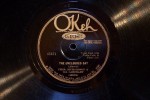 Unfortunately, at this point I only have a photo I found on the internet, but I hope someday to find some or all of the records.
Unfortunately, at this point I only have a photo I found on the internet, but I hope someday to find some or all of the records.
I already have ideas of using today’s recording technology to incorporate one of his records to create a duet or combined performance (oh wait, Hank, Jr. and Natalie Cole have already done this).
I guess I’m a sentimental person at heart, but I’m sure he’d be proud to know that he has a living legacy and I hope to leave one for my family to remember me by, as well.
Another example of the remarkable power of music.

